Exclusive! Kiccha Sudeep: A star is a good attention grabber, but to get people to theatres, they need a better reason
The Kannada superstar's Vikrant Rona is coming to theatres in 3D on July 28. Ahead of the release, he spoke to OTTplay about how a small idea became the big film that it is today, shooting during the pandemic, his idea of filmmaking today, etc.
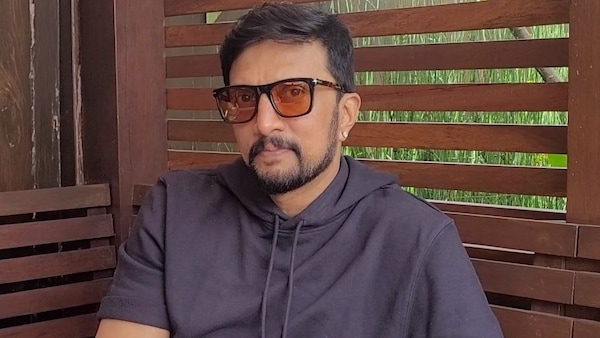
Last Updated: 10.58 AM, Jul 24, 2022
As I walked into Kannada superstar Kiccha Sudeep’s Bengaluru home a few days ago for a one-on-one interaction of his release this week, Vikrant Rona, I was reminded of my first time there. It was sometime in June 2004. Sudeep was fresh off the release of Ranga SSLC, and enjoying fatherhood, having welcomed his daughter Saanvi only days prior. Among the many things we discussed, Sudeep had spoken at length about singing for the film, something he was quite proud of, and sent me on my way later with an audio cassette of the same. There’ve been many more interactions since then, but this time felt different.
For Vikrant Rona, I was promised a 20-minute slot with him. “Not enough,” I muttered under my breath, but agreed nevertheless because Vikrant Rona is a film that Sudeep loves talking about. In the last month or so, he has given umpteen interviews and found different ways to say, perhaps, the same things about the film to everyone. And yet, he’s never bored of talking about the Anup Bhandari directorial, which releases in theatres on July 28. I knew there was no stopping Sudeep at 20 minutes. Here’s my 44-minute conversation with the superstar…
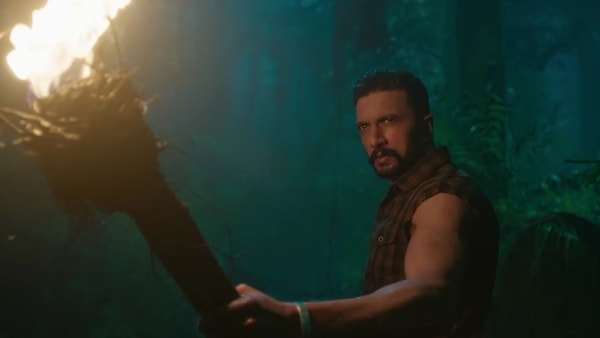
At the trailer launch of Vikrant Rona, you thanked your wife Priya for giving you that gentle nudge to take a look at Anup Bhandari’s script. At that juncture in your career, what is it that you were looking for that Priya thought this is the right film?
It sounded a little different and I was doing my regular commercial films at that point. Priya is a Malayali and keeps watching a lot of content-oriented films that are being made in the Malayalam industry. So, when she came across the script of Vikrant Rona, I guess she could connect to it easily. In fact, when she asked me to hear a narration of the script, it was meant as a project that we would produce with a newcomer in the lead. She was quite confident that I’d like it. When I heard the story, it was a very small film with a beautiful plot. Anup had written it as a low-budget film. At the time, I was already in discussion with him for our collaboration, Billa Ranga Baasha. We’d been talking for many months, and, I had an opinion about him – I knew him as a person and what he can do as a visionary.
So, when I heard Vikrant Rona, we took some time to ponder over it. I wanted to make it big, because I have always liked films like Indiana Jones, Tarzan, Jumanji, and used to wonder how they had such beautiful jungles and temples. It is only much later that I realised that it is all a beautiful mix of sets and visual effects. So, then, here I was, at a juncture at which I could do a film like that and I wanted to jump head-long into it. The moment I did that, the film went somewhere else, especially as far as budgets were concerned. For Anup, as a director with only two films to his credit, this scale is not something he could discuss with me and say, ‘Let’s make a big film’. He came with an idea and I began to sugar-coat it. The best thing that I thought is that my good friend and manager, producer Manjunath Gowda (Jack Manju) should produce it. Manju has made many films in his career, but never one as big as Vikrant Rona. But then he was also onboard the idea and today, when you look at him, your perspective of Manju as a producer has changed. He’s done such a wonderful job at putting this project together and it just grew multi-fold.
I put Anup’s idea on a different platter because I saw the potential in it. I was very confident that even if I take it to a much higher budget, he was capable of handling it and he did it very well.
As you just mentioned, Anup was all of two films old – one a hit and the other a dud. So, what gave you the confidence that he can handle a film of this scale?
If I didn’t have those instincts, I wouldn’t have worked with a lot of newcomers over the years, who have all come and made it big in the industry. My instincts tell me if someone is worth collaborating with and if he can handle the given responsibility. I will fail if I try to explain how that works for me – it just does. I felt that about Anup too. Beyond that, I also believe in myself immensely – the worst that can happen is that I will have to remove that person and I will takeover the project. One thing that I have always adopted in my life is that my car will never stop. With Anup, I never felt that at any moment that I will have to do that.
Vikrant Rona was a project that was in discussion well before the pandemic, including your decision to make it at the scale that it is at today. Yet, you went on floors with it at a time when there was so much uncertainty about if when and how the film industry would come back on its feet. You guys went ahead, unperturbed by any of this…
Truth be told, the film became even bigger after the pandemic. There was a scarcity for every resource that was needed for this film. For instance, let’s say, earlier there was a provision store just across the road and all one had to do to pick up rice was to cross the road. But then came a situation where rice was in Jayanagar, you understand? So, I needed resources, but all of that came from somewhere else and the budget went up accordingly.
We still went ahead and returned to the set because we did not have a reverse gear for our idea. By then, though, one major challenge that happened was that Manju was left with no investors because of the pandemic and the uncertainty of whether theatres will open and if at all life will come back to normal. We lived amid a lot of fear back then, so I will not blame the financiers who backed out because it is their money. I and Manju were unwavering in our decision to go ahead and somehow make the film. What I realized along the way is the goodwill that Manju had in society; I am surprised at how he’d make things happen. On days that we were stuck without money, he would find people ready to give him the funds we needed. We dared and time supported us.
Fair enough, but you did all this when you didn’t even know if this film was coming to theatres.
We were really not worried about the pandemic. If the world has to end it will. How does that stop you from trying to do something differently? I had to take a stand. Sets were falling apart and I couldn’t sit back and watch my friend go down. We started the shoot in early February, and by the end of the month the lockdown was announced. The sets at Annapurna Studio in Hyderabad were made of food and there were actual plants that had been put up for the forest scenes. We had to make sure that everything was intact and the plants don’t die. During the pandemic, we needed people to ensure that, but despite our best efforts, everything started falling apart, including the ferry, which is a 40-feet by 80 feet set made in wood, because it was all locked up. So, as soon as the government allowed us to cross the border and resume shooting, I said we ought to go, even with the limited resources we were allowed on set.

We were scared, no doubt, but time really supported us and we didn’t have a single case of Covid among the team until we finished the film. There were projects that started around the same time, but most of them shut down production because there were cases of Covid. Back then, there was no concept of a bio-bubble, but we created our own. Looking back, it seems scary and we ask ourselves how did we even manage this. We just wanted to survive. Our film had to reach the shore. It was like being on a boat and realizing as you sail along that it has holes and water’s trickling in. What do you do? Sink? You can’t turn back also. You will stick your fingers in those holes and somehow push the boat along. Vikrant Rona is the effort of many people plugging those holes for it to reach the shore.
In the time since, theatres have opened and life is almost back to normal. But there’s still the challenge of how do you bring people to theatres. It’s difficult to put a finger on what will click with audiences. Earlier, the complaint was that Kannada cinema did not have good content, now that it has, people are still not flocking to theatres…
That’s not entirely true… people are coming to theatres. They are fed up of staying at home and want to come out. But then a theatre is nothing but a replica of being back in pandemic times – shut inside four dark walls. That is the scarier part of the theatre experience now – you are taking them back to what they just got out from.
Having said that, people are not coming to theatres is because you are not giving them a good enough reason to head out. If you see the number of films that are doing well in theatres, there are quite a few, which is encouraging for filmmakers. People are valuing their money and time, but if they feel there’s something worth watching, they will be there.
Recently, there was a lot of buzz about Top Gun Maverick. It will come on OTT in some time, but people ran to theatres because they wanted to see its hugeness. Ultimately, it depends on whether your film has the potential to draw crowds.
Since you mentioned Top Gun and how people wanted to watch its scale on the big screen, has it now come down to that – star value and how big the production values are?
I don’t think it is star value alone. A good star is a good attention grabber, but what are you doing after that? If you are still doing that hero introduction, one fight and one song, with the same predictable story and narrative, do not expect something big to happen. Film may do well, but do not expect magic.
Today, people across the world have access to Indian content and are looking at it keenly. So, you need to ask yourself, do you want to tell your story to the whole world or just a few people in your state? What is it that you want? With every decision thereafter, comes the question of the budget to make it happen. People are ready to see any film, and when we say world cinema, it doesn’t mean that it has to be made at 150-200 crore. Even a small film can work wonders, like, for instance, Parasite. It was a tiny film, but the approach was appreciated – you are saying something new. Today it is more about that.
So, people are coming to theatres, just give them a good reason. Don’t fool them or take them for granted. Just saying that it’s a Sudeep film or has so and so combination, big song, etc., will not work anymore.
If films today are more than just larger-than-life heroism onscreen, is this a new start in your career?
I have said this a decade ago and suits me now. I have always maintained that we need to stick to the point in our narratives; why are we having a song or a massive scene to convey a small message? Story-telling was unnecessarily dragged along with an elaboration of things. Today, what is happening, people have started editing themselves. Say, if you watch a film on your personal gadget, have you noticed how many times you skip ahead by 10-20 seconds? If a song is happening and you are not inclined to watch it, you may just click ahead. Similarly, if there is a fight sequence, if it is interesting, you may watch it, else it has the same fate and you skip ahead. In the end, you would have seen a two-and-a-half-hour film in far less time and yet understood the entire story. This tells you that you need to stick to the point in filmmaking.
Let’s look at why you forwarded the film in parts – it’s not that there were no good-looking faces on screen. The moment some scene starts, you know, more or less, how it will unfold because you are so exposed to global content. And yet, after seeing the film, you may recommend it as a must-watch to someone else. The next person may have a different watching experience but both of you have understood the film. See the beauty of it. That is the speed at which people need to tell their stories at. Don’t have unnecessary things; that’s what cinema is about today. This kind of filmmaking is suiting me a lot. When everyone is editing, why don’t we do it ourselves?
With pan-Indian films, what is often the talking point on social media is the budget and scale and content is secondary. Is that a fair distribution? What also happens is that these discussions also lead to unnecessary fan wars online…
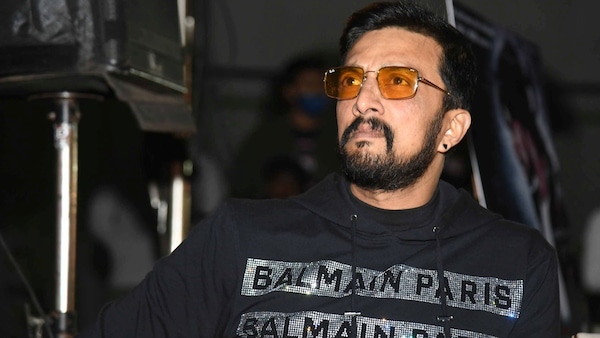
That’s because you can’t promote the content. As for the wars, they will always be there; we haven’t declared any of them. It has nothing to do with the actors. If you go to any actor’s house, he will be going about his life as usual and not fretting about what’s happening online. Some people are free and that’s why some stuff crops up online. Who’s declared war and who’s bothered about the numbers? I am only worried about my film and not what money someone else made. A hero, producer or director has never taken to social media to declare this war. This is the handiwork of some people that we don’t even know. That is then picked up by certain media and it becomes a talking point for us. Right now, as we have this conversation, someone may be making statements about Vikrant Rona thrashing some records, etc., etc., and comparing some hero to someone else, while we are sitting here and having coffee. That is not the serious part of the film industry; that’s the entertainment part, which, sometimes, we have a good laugh about.
When a film gathers huge numbers, we know the efforts and luck behind it. Everything needs to be counted. We may or may not have it, but how will we know till we give our product to society? Right now, all that we are worried about is to get this film to the shore and ensure it gets what it deserves. A lot of this depends on our fate, our promotion and the money we have invested, the content comes at the end of the day, when they see it in theatres. Until then, how can I promote the content? I can only promote my film. Once you watch it, you may like it or not because of the content.
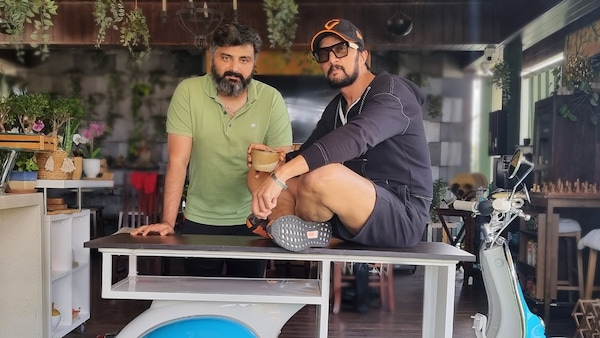
When we say budgets are all that’s being spoken about, there’s nothing unfair about it. A film may not have had a great storyline, but it is a box office superhit and made big money. Now, if people have accepted it and made it huge, why are we debating it? We can argue with the content, not the success. People have given it that status and we need to accept that.
Today, spending big bucks on the filmmaking alone is not enough, you need to pump in just as much into marketing it…
Let’s put it this way… How many times have you celebrated your birthday with a cake? What is the first thing you see? How it looks, what it says on it, the colour, the flavour… now that is marketing. Inside lies a simple sponge cake. It depends on who you are sending it to and decorate it accordingly. That decoration may cost you far more than the cake itself, so much so that you are mind-blown when you just look at it. When you cut it, it’s a regular vanilla, chocolate or red velvet cake. So, if you want to cater to a bigger volume of people, then marketing is the key. You cannot expect a miracle to happen every time. You can’t sit back and say, ‘I’ve made a film, if it’s good they will come and see it'. Then you are walking on very thin ice.
Coming back to cake, I can send you a simple, small sponge cake and think that you will understand my love. You will cut it just as you would the elaborately decorated one. But if one more big cake comes, that same person will smile at that one. Audiences are like that. They just see what you are giving. Cinema is like the cake; a chef can make it a lot better, but at the end of the day, it is still a cake and won’t be bad.
Vikrant Rona started small, but I had a different vision and told Anup that this is how we should make it. He was sitting with a small beautiful idea, but not in a position to say he wants to make it as a 100-150 crore film. He had not done anything like that, but he’s a man with ideas and I believed his brilliance and just did it. That is why we are now sitting and talking and getting excited about the trailer of Vikrant Rona. If my trailer is making the right noise today, it is only because of everybody’s effort of making it look at that scale, or rather, making it look international. And not just by talking.
Vikrant Rona always had a sound, but the perspective changed once the trailer came. We gave you a part of the film and suddenly you realized we weren’t just talking. We were crafting it all these years.
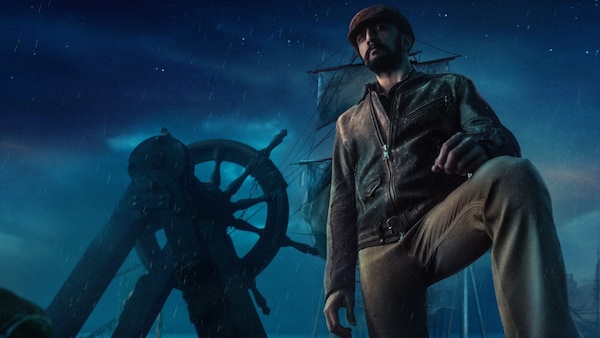
You have announced Billa Ranga Baasha as your next, which may be followed by Ashwatthama and Vikrant Rona 2 with Anup. When are you directing next?
There are a lot of people writing for me. There was a time when I was waiting for that and when it happening now, I need to cater to their needs. I don’t see direction as a necessity; it’s a passion. But when there are fabulous directors, why shouldn’t I look favourably at them? Probably the day the talk veers towards asking me why I don’t direct myself instead of doing certain films, then it makes sense. Right now, there are good dreamers, creative people around me. Irrespective of who I work with, I am equally involved in all aspects of the filmmaking, so it doesn’t change anything for me.
But if you were to direct anyone from the new crop of actors, who would you choose?
I would direct myself. I am the new crop, why should I consider myself old. I am still giving everyone competition. Many of the new people want to direct me, so why should I direct them? So, it’s a beautiful thought that I am able to cater myself. It’s not an arrogant answer. They still write for me, so in that process if insist on direction, I am putting myself down as an actor.
Subscribe to our newsletter for top content, delivered fast.

